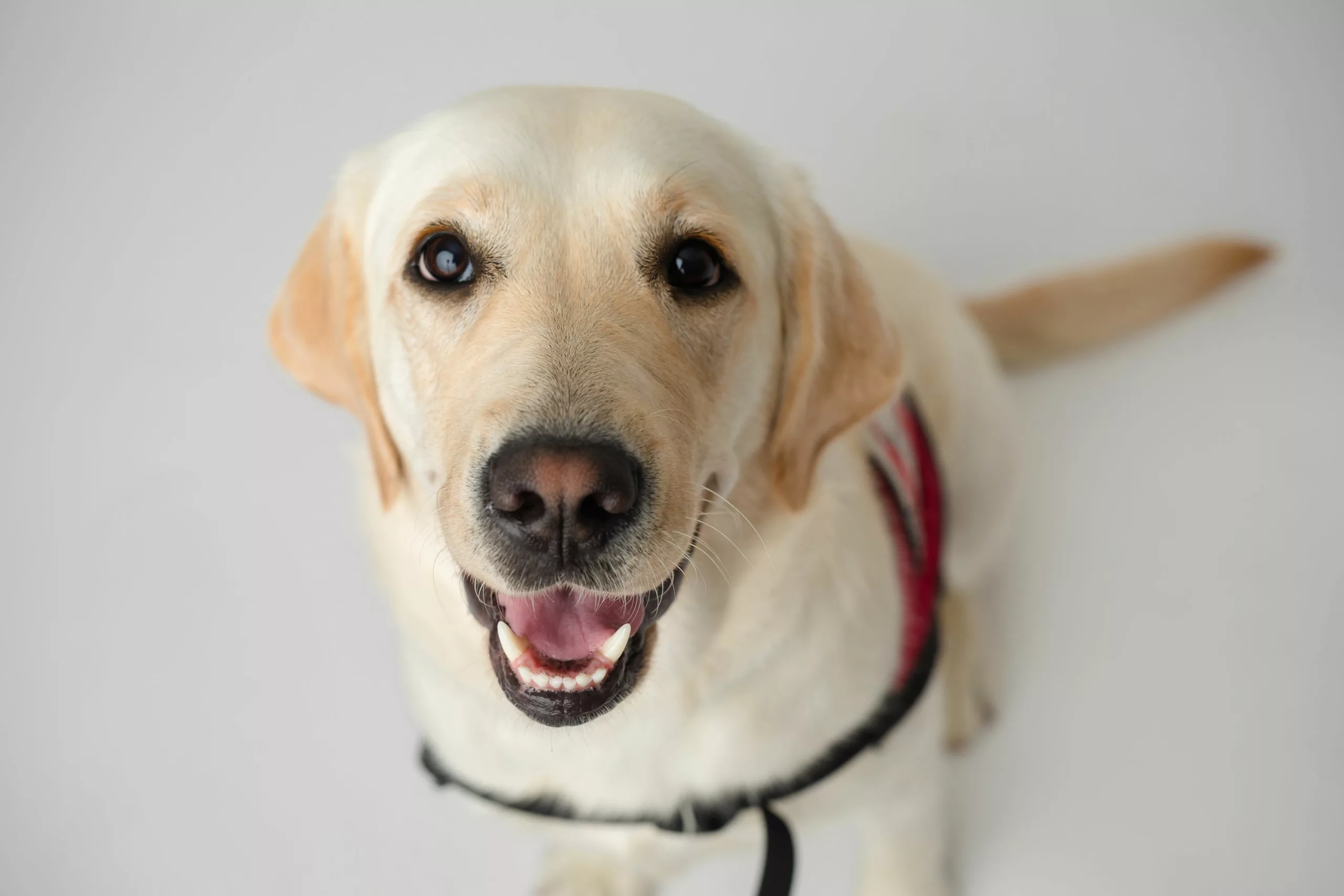By Alyssa Jackson -
When Kristi is feeling stressed or anxious, black Lab Dilly climbs up in her lap and licks her face until she’s feeling better. Dilly is Kristi’s new assistance dog, and she is so eager to help that Kristi now keeps a dog bed under the bathroom sink so Dilly can be in the room when Kristi is showering. Dilly has expressive eyes and is full of affection and a love of play.
Kristi was diagnosed with cerebral palsy when she was 9 months old. This condition makes Kristi’s muscles very tight, affecting her ability to walk, sit up unassisted, and get in and out of chairs. If she dropped her phone, she needed help from someone to pick it up for her. Before she had a Mobility Assist Dog, Kristi couldn’t leave the house alone due to difficulty opening and closing doors.
 She had considered getting an assistance dog in high school, but her family couldn’t afford to purchase one from a for-profit company. About 13 years ago, when Kristi was in college, she met a classmate with cerebral palsy who had an assistance dog from Can Do Canines. She reached out, and eventually, Can Do Canines matched her with her first Mobility Assist Dog, a male yellow Lab named Huxley. “He was the stepping stone to everything I have now,” she says. With Huxley at her side, Kristi had the independence to move more than two hours away from her family and eventually meet her partner and have children.
She had considered getting an assistance dog in high school, but her family couldn’t afford to purchase one from a for-profit company. About 13 years ago, when Kristi was in college, she met a classmate with cerebral palsy who had an assistance dog from Can Do Canines. She reached out, and eventually, Can Do Canines matched her with her first Mobility Assist Dog, a male yellow Lab named Huxley. “He was the stepping stone to everything I have now,” she says. With Huxley at her side, Kristi had the independence to move more than two hours away from her family and eventually meet her partner and have children.
About two years ago, Huxley fell ill. He was limping, and the situation progressed until he no longer would stand to get a treat. Huxley was diagnosed with degenerative back disease and gradually stopped eating and drinking. Ultimately, Kristi chose to let him go.
Kristi decided not to get another dog for a while. When her second child was born, though, she realized that she wouldn’t be able to be alone with the baby without the companionship of a new assistance dog. Even then, Kristi wasn’t sure if she was ready to commit to another dog, but eventually, she decided it was worth a try. Can Do Canines worked with Kristi to select a successor dog that could help her without reminding her too much of Huxley. They selected Dilly, and Kristi says, “I don’t think they could have found a better dog.”
Dilly picks up and retrieves items for Kristi, even fetching her phone from her young children if one of them gets a hold of it without Kristi knowing. Dilly also opens and closes doors for Kristi, and adjusts the push plate on Kristi’s wheelchair to help her in the bathroom. Kristi can signal to Dilly using verbal cues, but also with hand signs and eye contact, so they can communicate even in loud environments.
Kristi finally feels comfortable being alone again, because as she puts it, “Dilly’s got me.” She shares a recent moment when she had to rely on her new partner. “I was home alone, laying in bed. Dilly was in the bedroom with me and the door was closed. My phone kept going off but it was in the other room on the floor somewhere. I, on a whim, asked her to open the door and go get it. She brought it to me right away. This is something we have never practiced. I'm extremely proud of Dilly.”
She is also glad that the Can Do Canines trainers were able to teach Dilly to activate crosswalk plates. When Kristi went out to pick up her older child from school nearby, she would struggle to reach the crosswalk plate and risked sending her wheelchair over the curb. Now, Dilly accompanies her on these trips and Kristi can go about her day without fear. Her two young children claim a lot of her time, but taking care of Dilly’s needs helps Kristi take a break and enjoy her independence on a long walk by herself.
Thank you to all those who made this partnership possible:
Whelping Home — Steph and Seth Scott
Raisers — Diana Adamson, Melissa Andrade, The Cerar Family, Susan Forsberg
Special Thanks — Federal Correctional Institution-Waseca, Stanley Correctional Institution, University of Minnesota FETCH Program (Nola Bohrnsen, Hope Nelson)

 Facility Dog Gizmo Doesn’t Miss a Beat with his Support
Facility Dog Gizmo Doesn’t Miss a Beat with his Support




